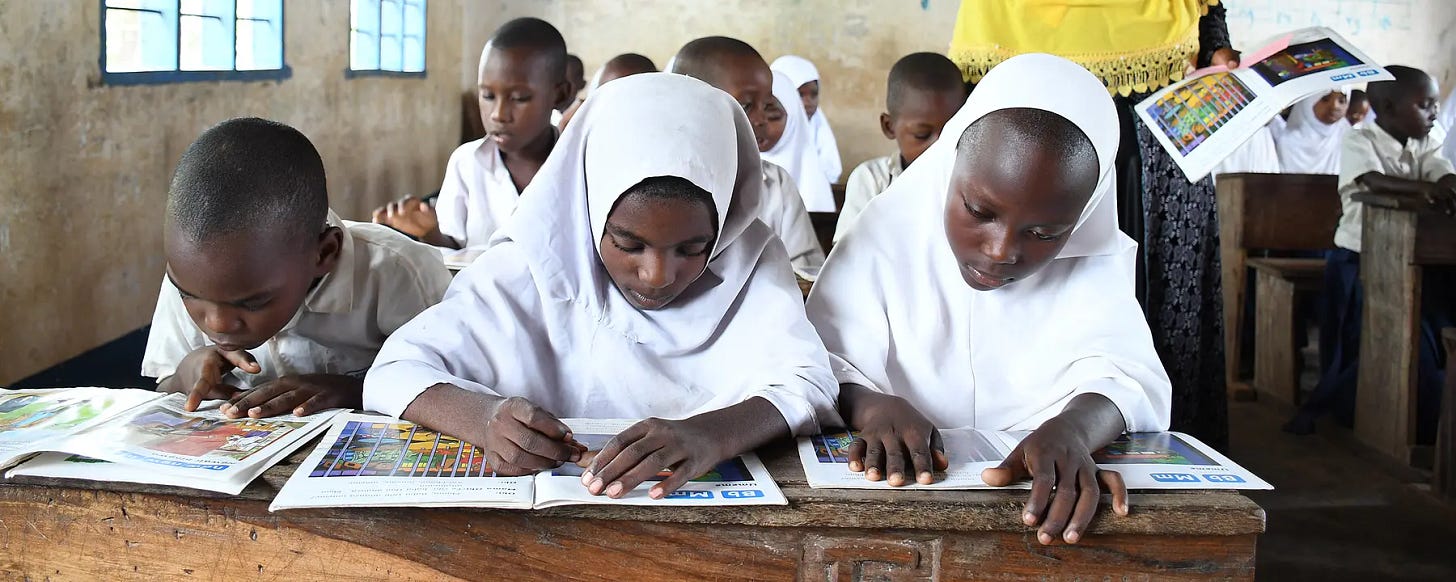Tanzania’s Education Reforms: Strengthening Kiswahili, Shaping the Future
Balancing Cultural Identity and Global Competitiveness in a Rapidly Changing World
File Photo, 2023. Source - Daily News, Tanzania
Tanzania has once again caught the attention of regional and global observers with its most recent set of education reforms. Local news outlets such as The Citizen and Daily News have been abuzz with updates on the government’s decision to shift the medium of instruction in primary schools from English to Kiswahili. International platforms like BBC and CNN have also weighed in on what this radical language policy means for the future of Tanzania’s education and workforce. While the reforms aim to strengthen local identity and improve foundational literacy skills, the move has sparked questions about how Tanzania can maintain its competitiveness in a rapidly globalizing world.
Why This Shift Matters
Tanzanians take pride in Kiswahili as both a unifying national language and a significant part of East Africa’s cultural tapestry. By promoting instruction in Kiswahili, policymakers hope to foster deeper engagement in the classroom, as students more easily grasp lessons presented in their mother tongue or a familiar national language. UNESCO and other education experts have long emphasized the benefits of mother-tongue instruction in early schooling: it enhances comprehension, encourages active participation, and builds a stronger educational foundation.
Moreover, the government aims to further entrench Tanzania’s cultural heritage in the next generation. Advocates argue that cultural identity stands at risk when foreign languages dominate academic curricula. The new policy thus underscores a national commitment to preserving local heritage and uplifting the role of Kiswahili across all layers of society.
Concerns About Global Competitiveness
Despite the anticipated educational benefits, local and international analysts caution that a diminished focus on English could potentially hinder Tanzania’s competitiveness—particularly in higher education, international diplomacy, and the global marketplace. Major continental and global institutions, including the African Union and the United Nations, frequently operate in English or French. Graduates fluent in these global lingua francas often command higher leverage in securing opportunities both within Africa and beyond.
Parents and teachers, especially in urban centers, have also expressed concerns about how these reforms might affect students preparing for careers in STEM fields or aiming to study abroad. English proficiency remains a gateway to many international scholarships and career tracks. As such, striking a balance between strengthening local language capacities and fostering proficiency in global languages remains a pressing concern for policymakers.
The Policy and Political Context
Tanzania’s leadership has steadily prioritized inclusive development since the tenure of President Samia Suluhu Hassan, who has highlighted education reform as a key pillar for sustainable progress. The Ministry of Education’s budget allocations for teacher training, textbook development, and infrastructural improvements signal serious intent. According to The Guardian (Tanzania), there are also discussions around hybrid curricula in the future, potentially offering English instruction in later years of schooling or integrating technology to facilitate bilingual education.
From a wider African perspective, Tanzania’s reforms reflect growing discourse on the importance of indigenous languages in national development. Countries like Ethiopia, Rwanda, and South Africa have also experimented with mother-tongue instruction. If Tanzania navigates these reforms skillfully, it could become a trailblazer for an Africa-centered education paradigm that upholds local values and traditions while preparing learners for global participation.
Moving Forward: Recommendations for Good Governance and Inclusive Leadership
Bilingual Curriculum Design
Policymakers should consider a phased bilingual approach—beginning primary education primarily in Kiswahili, while progressively integrating English or other international languages. This balanced framework can help preserve cultural identity while equipping students with global communication skills.Teacher Training and Support
Continuous professional development programs for teachers are crucial. Equipping educators with innovative pedagogical tools—possibly through mobile apps, online platforms, and blended learning—will ensure that they are prepared to teach effectively in both Kiswahili and English.Inclusive Stakeholder Engagement
National and local governments should broaden consultative forums to include parents, civil society organizations, educational experts, and students. Engaging multiple perspectives will help identify practical challenges and sustainable solutions.Leverage Technology for Global Competitiveness
Incorporating digital platforms in classrooms can bridge the language divide and connect students to international resources. Partnerships with tech companies can help develop interactive learning modules in Kiswahili while offering optional English support tools for older students.Strengthen Regional Collaborations
Tanzania should capitalize on East African Community frameworks, Pan-African institutions, and international educational networks. Sharing lessons learned with neighboring countries experimenting with language-in-education policies will bolster the impact of these reforms.
A Hopeful Outlook
Tanzania’s bold education reforms signal a desire to reclaim the place of Kiswahili—both as a language of cultural pride and as a foundational tool for early learning. Although concerns about global competitiveness are valid, strategic policy-making that prioritizes bilingualism, leverages technology, and engages all stakeholders can help Tanzania strike the right balance. If carried out with foresight and inclusivity, these reforms have the potential to become a blueprint for educational innovation across Africa—celebrating local heritage while forging global pathways for future generations.
Thank you for reading The Inclusive Policy Digest. Together, let us foster a community where diversity in education, governance, and leadership paves the way to equitable development. For more in-depth policy analyses, exclusive interviews, and a chance to engage with fellow change-makers, consider subscribing. Stay informed, stay inclusive!





